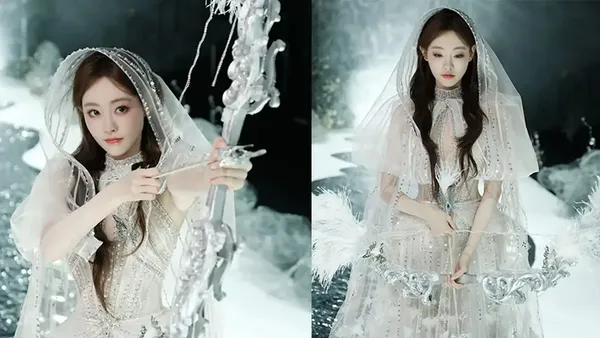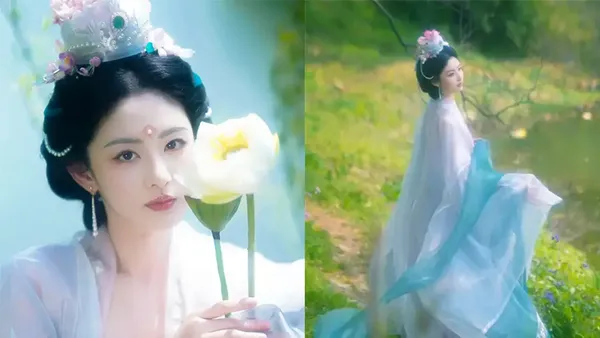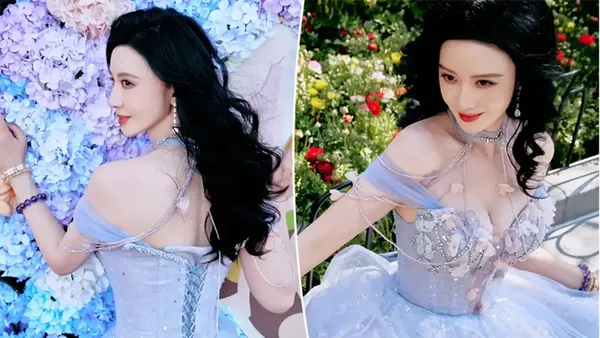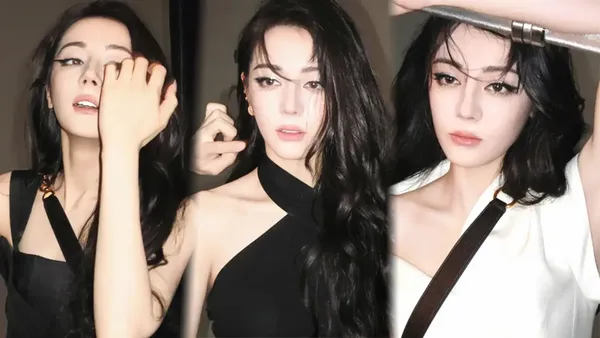How does the commercial legend in Chinese history appear vividly in film and television dramas?
It can be said that through the theme of women's growth,"Flowers and Moon in That Year"raises the feelings of family and country and national righteousness of commercial legendary drama to a new height. Modern Chinese national enterprises and patriotic businessmen always share the same fate with the Chinese nation. Commercial legendary drama takes business war, family, hero legend and love as its main elements, and adopts the story mode of Bildungsroman, which has strong regional customs.
in the TV series "the full moon in bloom that year", Zhou Ying, played by Sun Li, inherits the business idea of "honesty" and finally becomes a "three-hard" businessman with hard person, hard goods and hard temper.
the popularity of the TV series "the full moon in blossom that year" has brought business legends back to people's horizons.after entering the new century, with the popularity of TV dramas such as "Dazhaimen", "Da Dye Fang" and "Joe's Courtyard", commercial legendary dramas have become a new type of drama and once became the darling of the TV drama market. "Dazhaimen" was broadcast on CCTV in prime time and won the annual CCTV championship in 2001 with a rating of 17.74 points. "Qiao's Courtyard" not only won the championship of TV series in mainland China in 2006, but also won the 26th Chinese TV Series Flying Awards, the first prize of excellent feature-length TV dramas, the 10th five-one Project Award and other awards. Business legends take business war, family, hero legend and love as the main elements, apply the story mode of growing-up novels, and have strong regional customs; at the same time, they have become a new type of drama, although there are a large number of homogenized and typed dramas, but there are also many works trying to achieve ideological and artistic breakthroughs.
< strong > makes it easier for audiences to have a sense of historical substitution < / strong >
< strong > based on people and things that really existed in history. < / strong >
< / strong >< strong >
<
<
< For example, Tongrentang, the prototype of Baicaotang in Dazhaomen, is a household name, Hu Xueyan is a historical figure, Qiao Zhiyong in Qiao's Courtyard also has character archetypes, and so on. This kind of plot and people make it easier for the audience to have a sense of historical substitution.
Business legendary dramas are roughly divided into the following categories: first, the family-country isomorphic "Zhaimen" series, represented by "Dazhaimen" and "Qiao Family Courtyard"; second, the business legendary hero series, represented by "Qing Huizhou Merchants" and "Daqing Salt Merchants"; third, "Business Road" series, represented by "entering the East pass", "going to Xikou" and "Great Business Road". These three types of business legendary dramas have both generality and individuality, and there is both emphasis and intersection in the plot and character setting.
the commonness is mainly reflected in the combination of family narrative and business hero legends-most of the business empires in Chinese history are family businesses, families and business names share weal and woe, and the head of the family and the ruler of the business empire have identity. Almost every business empire has a superhero, such as Bai Jingqi, Hu Xueyan, Qiao Zhiyong and so on. Secondly, women and love are the catalysts for the growth of heroes. At the same time, a successful business legend must be an emotional drama, and emotional drama is like seasoning, which is more or less difficult to grasp. "Dazhaimen" portrays Bai Jingqi, a commercial genius and prodigal son, at the same time, it also shapes female images such as Bai Wenshi, Yang Jiuhong and Xiangxiu, but the female images in dramas such as "Qiao's Courtyard" are much inferior and become tools for male growth and seasoning for plot development.
in terms of personality, "Zhaimen" series has strong regional customs, such as the Beijing flavor of "Dazhaimen", the Jin cultural characteristics of "Qiao Family Courtyard" and so on. The business legendary hero series focuses on the shaping of the main heroes. Before the full moon in that year, this kind of play was a typical "male lead play". All the characters in the play exist for the only hero. the female lead role can not compete with the male hero, such as Hu Xueyan, all female characters serve for the growth of male heroes. The "Business Road" series, as its name implies, tells the story of walking on the road, that is, in the process of business heroes opening up business roads and building business empires, the natural scenery, exotic customs, national culture, national destiny and commercial war are organically integrated to bring visual impact to the audience and produce a defamiliarization effect. Such as the transformation of scenes such as the coastal areas of Shandong, the snowfields of Kanto and Harbin in "Qianguandong", the slow camels and the melodious Xin Tian you on the commercial road in "going to the West mouth", and the Coulomb grassland in "Dashang Road", all add a lot of color to the play.

< strong > can only proceed from Chinese history < / strong >
< strong > Chinese business legendary dramas cannot apply the western story model, nor can they fully apply the story model of martial arts drama or palace fighting drama. < / strong >
truly lays a cultural background and gives spiritual connotation to commercial legendary dramas. It is China's unique commercial culture and commercial spirit, such as honesty and trustworthiness, courage to open up, tenacity, and sharing a common destiny with the country and the nation. The real business hero must have national feelings and national righteousness. The 83rd edition of the TV series The Legend of the Condor Heroes has promoted the spiritual character of jianghu heroes, and the chivalrous spirit of kindness and hatred has been given a new connotation, injected into the feelings of family and country and the great righteousness of the nation, and embodied into the heroic image of Guo Jing, condensed into the classic expression of "the great man of knight-errant, for the country and the people". The commercial legendary drama draws lessons from and applies this technique of Jin Yong, creates the image of a large number of commercial heroes who "serve the country and the people", and inherits the national cultural spirit of sharing a common hatred against the enemy, helping the poor and helping the weak, echoing the audience's cultural and aesthetic expectations.
however, literary works cannot be recognized by the audience if they only have slogans and preaching. Chinese business legends cannot apply the western story model, nor can they fully apply the story model of martial arts dramas or palace fighting dramas. It narrates Chinese business legends from the perspective of Chinese history.
Chinese society has a tradition of attaching importance to agriculture and suppressing commerce in history, which leads to the difficult and awkward identity and status of businessmen for a long time. On the one hand, businessmen have made great contributions to social and economic prosperity, ensuring the circulation of goods and promoting cultural exchanges, especially when the country and nation are invaded by foreign nationalities and are faced with emergencies and natural disasters, businessmen always put the national interests first, give priority to the sufferings of the people, contribute money and efforts, co-exist with the nation, sacrifice personal interests, and safeguard national dignity and social stability. But on the other hand, in the feudal period, the establishment and destruction of those huge commercial empires were closely related to the imperial court or government. This undoubtedly provides a wealth of creative materials for business legends.

looks at" the full moon of that year "from this perspective. Although the gender of heroes has been changed from male to female, it still inherits the mainstream tradition of business legends. The beginning of the play is not flattering. Zhou Ying is a living "Little Swallow", and then turns to the palace fighting mode and "Mary Su" routine. the growth and counterattack of women depends on the men behind her, and the value of women can only be realized by conquering men. This custom began to break through after Zhou Ying went to the northwest to resolve the crisis with courage and wisdom, excluding the purchase of all shares in Shaanxi Weaving layout and a series of subsequent actions, so that the audience could see the image of a woman standing side by side with men as a "tree." Zhou Ying experienced the commercial enlightenment of Wu Pin and Wu Weiwen, and the support, admiration and following of men such as Shen Xingyi, Zhao Baishi, Tuldan and Wang Shijun. Finally grow up, can be on their own, began to have self-conscious modern consciousness and female consciousness. Zhou Ying inherited the business idea of "honesty" of the Wu family, and became a hard, hard-tempered and hard-tempered businessman. she was brave to open up, was good at flexibility, and was able to share profits with business rivals and partners. She pioneered the shareholding system, which made the fate of the Wu family from shopkeepers, workers to weavers and servant girls share weal and woe, forming a huge community of interests. This business concept and the way of doing business, even in modern times, are still of progressive significance.
Zhou Ying did not hesitate to spend a lot of money on water conservancy, schools, bridges and roads, and relief for disaster victims, but refused to donate money to the empress dowager for pleasure. She is not only a businesswoman with the feelings of family and country and the ideal of saving the world, but also a strange woman who insists on pursuing truth and justice. The Wu family was destroyed and killed because of the "military supplies case." starting from the simple folk ethics, she firmly believed that her father-in-law and husband had been framed, and vowed to find out the truth and seek justice for the Wu family. In the process of exploring the truth, she was deeply aware of the corruption of the Qing court, consciously accepted the reform idea of political reform, invested in the establishment of Jingyang cloth factory, and embarked on the road of revitalizing the motherland with national industry.
it can be said that through the theme of female growth, the Flower and Moon in that year has raised the family and national feelings and national righteousness of business legends to a new height. China's modern national enterprises and patriotic businessmen have always shared the same fate with the Chinese nation. I think this is also the greatest value of the play.
(the writer is a professor at the School of Journalism and Communication, Northwestern University of political Science and Law)
Editor: mary
 白羊座
白羊座 金牛座
金牛座 双子座
双子座 巨蟹座
巨蟹座 狮子座
狮子座 处女座
处女座 天秤座
天秤座 天蝎座
天蝎座 射手座
射手座 摩羯座
摩羯座 水瓶座
水瓶座 双鱼座
双鱼座









